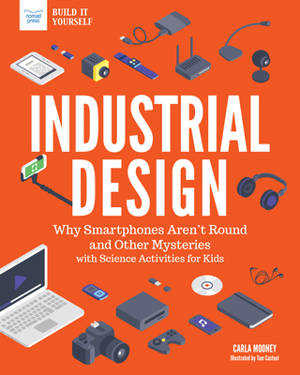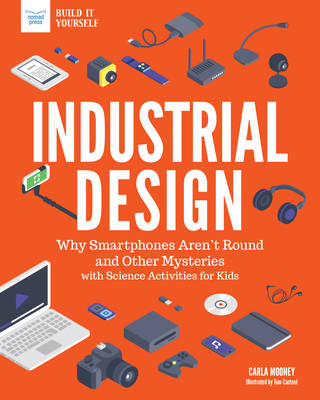
- Retrait gratuit dans votre magasin Club
- 7.000.000 titres dans notre catalogue
- Payer en toute sécurité
- Toujours un magasin près de chez vous
- Retrait gratuit dans votre magasin Club
- 7.000.0000 titres dans notre catalogue
- Payer en toute sécurité
- Toujours un magasin près de chez vous
Industrial Design
Why Smartphones Aren't Round and Other Mysteries with Science Activities for Kids
Carla MooneyDescription
What is industrial design? How does it affect our everyday lives?
Why do microwaves open with a swinging front door? Why aren't smartphones round? Why do drivers sit on the left in the United States?
Industrial design is the study of the design process behind the products we use every day, from blenders to school buses to laptops. In Industrial Design: Why Smartphones Aren't Round and Other Mysteries with Science Activities for Kids, readers ages 10-15 engage in and learn about the engineering design process from its earliest beginnings when individuals designed and crafted their own tools to today, when engineers work to find the best design for products that are then manufactured in bulk by automated machines.
In Industrial Design, readers practice their own engineering design skills using the engineering design process and learn how to create useful, aesthetically pleasing designs for a variety of products. They learn about the history of industrial design and the transition from craft-based design to mass production. Through fun science and engineering projects, they explore the steps of the industrial design process including brainstorming, idea sketching, technical drawings, creating models and prototypes, and product testing. Like a good designer, they learn how to evaluate products for function, usability, ergonomics, aesthetics, and green design. Throughout Industrial Design, inquiry-based activities, essential questions, links to online primary sources, and an extensive engineering glossary all promote critical and creative thinking and serve to highlight the importance and beauty of engineering design and the role it plays in our world.
In the Technology for Today set, readers ages 10 to 15 explore the digital and tech landscapes of today and tomorrow through hands-on STEAM activities and compelling stories of how things work, who makes them work, and why. Titles in this set include Industrial Design: Why Smartphones Aren't Round and Other Mysteries with Science Activities for Kids; Big Data: Information in the Digital World with Science Activities for Kids; Projectile Science: The Physics Behind Kicking a Field Goal and Launching a Rocket with Science Activities for Kids; and Artificial Intelligence: Thinking Machines and Smart Robots with Science Activities for Kids.
Nomad Press books integrate content with participation. Common Core State Standards, the Next Generation Science Standards, and STEM Education all place project-based learning as key building blocks in education. Combining content with inquiry-based projects stimulates learning and makes it active and alive. Nomad's unique approach simultaneously grounds kids in factual knowledge while allowing them the space to be curious, creative, and critical thinkers.
Spécifications
Parties prenantes
- Auteur(s) :
- Editeur:
Contenu
- Nombre de pages :
- 128
- Langue:
- Anglais
- Collection :
Caractéristiques
- EAN:
- 9781619306721
- Date de parution :
- 03-08-18
- Format:
- Livre broché
- Format numérique:
- Trade paperback (VS)
- Dimensions :
- 203 mm x 254 mm
- Poids :
- 272 g

Les avis
Nous publions uniquement les avis qui respectent les conditions requises. Consultez nos conditions pour les avis.






